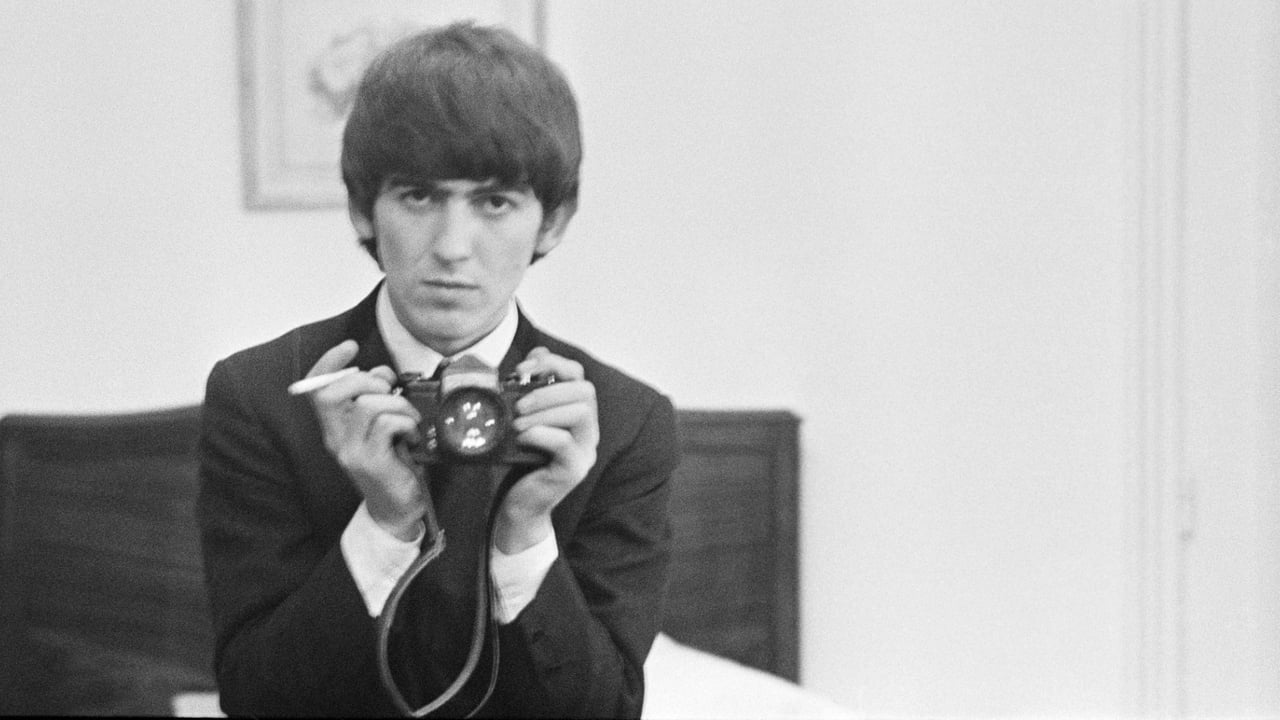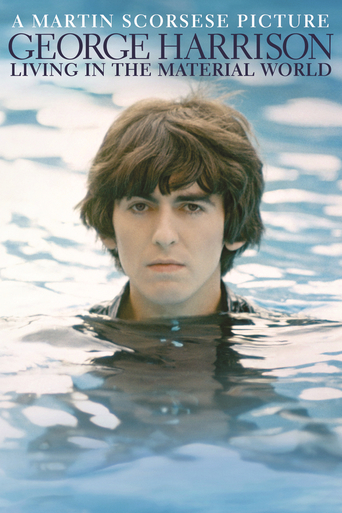

When all is said and done, the viewer comes away from this documentary knowing more about George Harrison than one did before, but I couldn't help thinking that there was just too much of a stream of consciousness approach to getting it all down on film. I can't tell you how many times the narrative got muddled with clips of Harrison presented in no semblance of chronological order. You would see him alternately with a beard, clean shaven, mustache with no beard, lean in appearance and then heavier with age, all within a short time span as he reflected on his role with The Beatles and discussing other areas of his life.But even for long time Beatles fans, there are probably enough nuggets of new information to make the nearly four hour effort worth your while. Most of the first disc in the two disc set talks about the Beatles years, but with somewhat of a superficial gloss to a handful of topics that in some cases seemed to apply more to Paul and John. What particularly interested me was how George entered the post-Beatles phase, delving into Indian philosophy and spirituality. I was happy to see the transition to The Traveling Wilburys period. To this day, I think it's some of the finest music one can listen to from an incredibly talented assemblage of performers.When I think back upon my own life and recall the history of The Beatles as they first emerged on the music scene, I feel kind of bad for those who missed that experience simply by being born too late. It's easy enough for seasoned citizens like myself to pick out contemporaries in the documentary like Donovan, Twiggy, Petula Clark, Billy Preston and Leon Russell, but because their appearances are so fleeting without being identified, they become just nameless faces in the crowd for casual viewers. For some reason it makes me a little sad.One thing I had long forgotten about was the attack on Harrison's home in England by a deranged 'fan'. Harrison's wife Olivia opines on that event in frightful detail. Other folks who have things to say about Harrison throughout include Paul and Ringo, Eric Clapton, other Harrison family members, and a whole host of performers who shared the stage with the former Beatle. I found it particularly ironic, only due to my timing in watching the film, to hear Tom Petty speak about the phone call he got from George the day after Roy Orbison died. Harrison's only words were "Aren't you glad it's not you?" With Petty's own death a mere month or so ago as I write this, it won't be long in the grand scheme of things for all these musical icons to eventually move on to a better place. Quite sadly, those that have passed on are already terribly missed.
... View MoreFirst up, a music documentary on a music celebrity can be measured by content and insight. On the first point Martin Scorsese knocks the ball right out of the park. There is no bigger Martin Scorsese fan than myself, but this does not have a Scorcese feel and by the end I just didn't feel I knew George Harrison any better than before. Let's face it folks, his role in the Beatles has been told many, many times. There was nothing new in the movie that hadn't already been published but the very short interviews with his siblings at the beginning left me wanting to know much more.There was no narration to carry the movie so it was essentially a grab bag of items made from interviews and clips without explanation. The closest we get to a voice-over is Dhani Harrison reading excerpts from his father's diary and letters to his Mom. Having said that, there were moments of joy and beauty. It is worth a watch and I did appreciate him more after watching and many fans will find it awesome
... View MoreThe rock doc format is a tricky one and one that's not been done well very much, ever.The Beatles' Anthology was a huge exception - that was one hell of a great documentary, giving us an incredible number of new insights into the world's greatest rock band ever. But that documentary was done with the full cooperation of the surviving Beatles.Here, Martin Scorcese takes on a trickier subject - that of a reclusive Beatle, post mortem - and produces a gem. Like any great documentary, there were many revelations that rewarded the viewer with insights into a great but little-known man. This was the least-interviewed and least-public Beatle and it took a lot of hard work to produce this, no doubt. So kudos to Scorcese indeed.True, too, is that this is a warts-and-all biography - which any great documentary should be. It doesn't tarnish the love you likely feel for Harrison. It just makes him more human. Turns out, for instance, that he was not only the funniest of all the Beatles (as you will find out), but also capable of the most biting honesty when he didn't like something a person did (and his wit was perhaps even sharper than John Lennon's, in the doing). OK - so he was human, like you and me. Not perfect, but nothing revealed makes us lose the slightest bit of admiration and respect for him.The movie did, however, tarnish my view of one of my other idols, Eric Clapton, who is caught in a big lie in this film. Shame on you, Eric. George forgave you but I don't.Finally, like any great documentary, you're going to be sad when it ends. (Any other footage you could use for a part 3, Marty?)
... View MoreMartin Scorsese has put together a beautiful documentary tracing the life of the most underrated member of the Beatle's, George Harrison. With a run time of over three and half hours, Scorsese is able to explore the various layers that went towards forming Harrison's absolute identity. Through the use of personal letters, pictures, home-videos, and never-before-seen interviews, the viewer is given the rare opportunity of discovering Harrison beyond The Beatles.The documentary is essentially divided into two parts, the first of which follows the formation and success of The Beatles. Whilst the second focuses on Harrisons spiritual journey to find meaning beyond the capitalist world he found himself trapped in.Through the careful selection and juxtaposition of archival footage and documents, Scorsese emphasises the bittersweet realities of The Beatles rise to fame. Unfolding the story of four naïve British lads torn between childish excitement at their growing success, and apprehension towards the zealous fan-base it gained them. This clash of ideals is exemplified by Harrison in a letter to his parents: "Dear Mum and Dad – The shows have been going great with everyone going potty everywhere we go we have about 20 police on motorbikes escorting us".The fervent behaviour of the fans escalated to the point that all four Beatles decided it was best to avoid any public outings. Frustrated by the confinement fame had enforced on him, Harrison became disillusioned by the material world, and seemed to experience a displacement of the self. In an interview he stated: "you see yourself in the paper but don't actually realise it's you".This displacement of identity led Harrison to pursue a spiritual path in the hopes of attaining the meaning of life through philosophy. Under Guru Ravi Shankar, Harrison learned to use Indian spiritual music to become one with a greater philosophical being. His friendship with Ravi also led Harrison to fund and organise the first ever benefit concert: The Concert for Bangladesh, which raised funds for refugees from East Pakistan following the 1970 Bhola Cyclone.Scorsese also uses the documentary as a medium through which Harrisons song writing credentials can be measured against the Lennon/McCartney partnership. "George was a loner and had to work on his own" states George Martin (Producer of four of The Beatles original five albums).It was therefore inevitable that Harrison would get lost in the shadows of the superpower that was the Lenon/McCartney writing team. Scorsese traces the anatomy of Harrisons body of (solo) work, highlighting in particular their spiritual origins. Whilst Lennon/McCartney's work exemplified masterful popular music, Harrison's engaged with his spirituality, and search for meaning in life. Scorsese incorporation of Harrison's solo work in the documentary illustrates the importance it holds to understanding his psyche.Scorsese's documentary excels in exposing hidden dimensions of Harrisons life and personality; from his love triangle with Pattie Boyd, and Eric Clapton, to his financial funding of Monty Python. Bringing together a multitude of Harrisons professional and personal acquaintances (including Eric Clapton, Ringo Starr, Paul McCartney, Terry Gilliam, and Eric Idle), and artifacts from his personal archive, Scorsese creates a colourful mosaic capturing the diversity that constructed George Harrisons life, and personality.
... View More